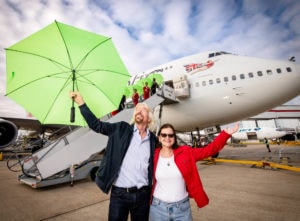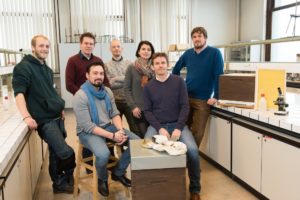Science, technology and innovation are often regarded as critical to achieving the Sustainable Development Goals. However, while scientists have been alerting society for decades on the negative impacts and risks linked to human activity — climate change, growing pollution levels, biodiversity loss, resource scarcity, food security. Their potential to solve these issues has been overlooked so far.
A new generation of entrepreneurs — more specifically, social science-preneurs — have come up with innovative science-based solutions in order to bring about a positive impact.They are launching a new dynamic in the field of science, technology and innovation for the common good.
Harness the power of science for good
Science should not be seen as a purely disconnected activity, whose only function would be the advancement of knowledge, nor as a mere economic activity, providing innovative products and services to generate financial value.
Currently, there is an urgent need to give a strong impetus to scientific research and innovation in order to benefit society. Far from being the solution to our highly complex and global challenges — and naïvely supporting the myth of science as the panacea for all ills — scientific research can and should, however, contribute to resolving them when possible. There is a need for stretching the boundaries of the research system and offer a new approach. This approach, called “social valorization”, consists of transforming research results into social value by applying them to solve social and environmental issues.
We need therefore to strengthen the societal contribution of research to achieve the SDGs, particularly as it irrigates all of them, from promoting food security (SDG 2), access to healthy habitats (SDG 3), to reversing climate change (SDG 13) and preventing biodiversity loss (SDG 14, SDG 15), and many more.
As a collective endeavor, science, technology and innovation are also tightly linked to SDG 17 – Partnerships for the Goals, and in particular to target n°16 on multi-stakeholder partnerships. Indeed, in order to achieve transformation, all actors must be mobilized and collaborations on the field between researchers and civil society must be encouraged. Such collaborations with new players, notably social science-preneurs, will create a new dynamic aimed at societal impact from inside the research system.
Social Science-preneurs: pioneers in the field of science, technology and innovation
Over the past few years, a new breed of entrepreneurs striving to make a positive social impact with science-driven solutions has arisen: social science-preneurs. At the intersection of scientific research and social entrepreneurship, social science-preneurs are at the forefront of this new dynamic of “science for good”. They are using science to develop relevant, efficient, and accessible solutions, according to the needs of beneficiaries.
We have identified three types of social science-preneurs:
- Scientists becoming social entrepreneurs:
- Lanzatech (NZ-US): A biotech company who developed an innovative process based on the principle of fermentation, with the help of bacteria, to recover and re-use the carbon found in industrial fumes. The company was found in 2005 by scientists Dr. Sean Simpson and Dr. Richard Forster. When they first met, both were focusing on developing fuels that emit less CO2. They were looking for something cheaper that came from highly abundant feedstocks. They rapidly identified the waste that society produces, whether it be from industrial, agricultural or urban activities as the ideal feedstock. After raising money through venture capitals, they started the company in New Zealand (NZ) and partnered with the NZ steel industry.

-
- BeeOdiversity (Belgium): Bach Kim Nguyen, scientist and expert on the demise of bees, has identified the three main causes of bee mortality: pollution, lack of biodiversity and diseases. After completing his PhD, he wanted to act in favor of change and have an impact in the field, so he co-founded the social enterprise BeeOdiversity in 2012 with the aim of improving human and environmental well-being. The team is collaborating with bees by analyzing the data they collect and then bringing the bees back to the hive after pollination. They can therefore identify pollution and biodiversity levels surrounding bees in order to reduce pollution and promote biodiversity.

- Collaborations between social entrepreneurs and scientists:
- Earthenable (US-Rwanda): Dirt floors can contribute to diarrhea and parasitic infections. In Rwanda, this is the main cause of mortality among children as most households cannot afford to buy Epoxy Flooring. To address this issue, EarthEnable, founded by social entrepreneur Gayatri Datar, developed a vegetable-oil based chemical essential to stabilizing and sealing a low-cost sanitary earthen flooring, which they promote and install as an affordable alternative to disease-causing dirt floors. To come up with this new product, she collaborated with Rick Zuzow, who has a Ph.D. in biochemistry from Stanford.

-
- Nutriset (France): In 1994, social company Nutriset and the French Research Institute for Development (IRD) revolutionized the fight against malnutrition by introducing RUTF (Ready-To-Use Therapeutic Food). This innovation is the result of the successful collaboration between entrepreneur Michel Lescanne, founder of Nutriset, and André Briend, medical doctor and researcher in nutrition at IRD. Since then, they have brought accessible nutritional solutions ranging from treatment to malnutrition prevention to protecting vulnerable populations.

- Social entrepreneurs that aim to increase their scientific skills:
- Leka (France): A French social entreprise that develops a playful robot to improve autistic children’s abilities to learn, communicate and move. Yet, the founders Ladislas de Toldi and Marine Couteau are no roboticists! Former biotech engineers, they met with several experts to develop the skills they needed to develop the first prototype of Moti, their robot.

-
- Glowee (France): A French social enterprise that offers a new kind of energy, coming directly from nature. They are at the crossroads of biomimicry and synthetic biology, revolutionizing the way in which we produce, consume and light up. Founded by designer Sandra Rey in 2014, the R&D activity is entirely supported in-house, with the help of a recruited team of biotech scientists.

Promote the emergence and acceleration of the development of social science-preneurs
While there is a growing awareness of science’s potential in the resolution of some of the most pressing societal challenges — as the emergence of social science-preneurs demonstrates — many hurdles still prevent scientific research from being actively incentivized towards this goal.
As new players, social science-preneurs often confront barriers when it comes to finding financial and scientific support; they also face a lack of recognition from the scientific world. On the contrary, scientists in research organizations willing to contribute to projects with and for civil society are not incentivized nor rewarded to do so in the current research career advancement system.
Editor’s Picks – Related Articles:

“An Enabler to SDGs’ Attainment: Linking Science with Human Rights“

“Millennial Scientists in a Segregating World – The Role of Science in Shaping Society”
Shining a light on social science-preneurs is one way to promote these new dynamics in favor of the common good. In November 2018, we launched the Science for Good initiative with the aim of revealing the synergies between science and social entrepreneurship and to highlight relevant actors within the field.
However, we need to go further. We need to adapt the framework of scientific research itself: think about new incentives, funding allocations, specific calls for projects, and evaluation criteria to include social science-preneurs, as well as reward scientists that engage in multi-stakeholder partnerships within society. To accomplish such, we will need to gather all scientific actors and facilitators — public institutions, political bodies and private companies – around the social contribution of scientific research in order to achieve the SDGs by 2030.














